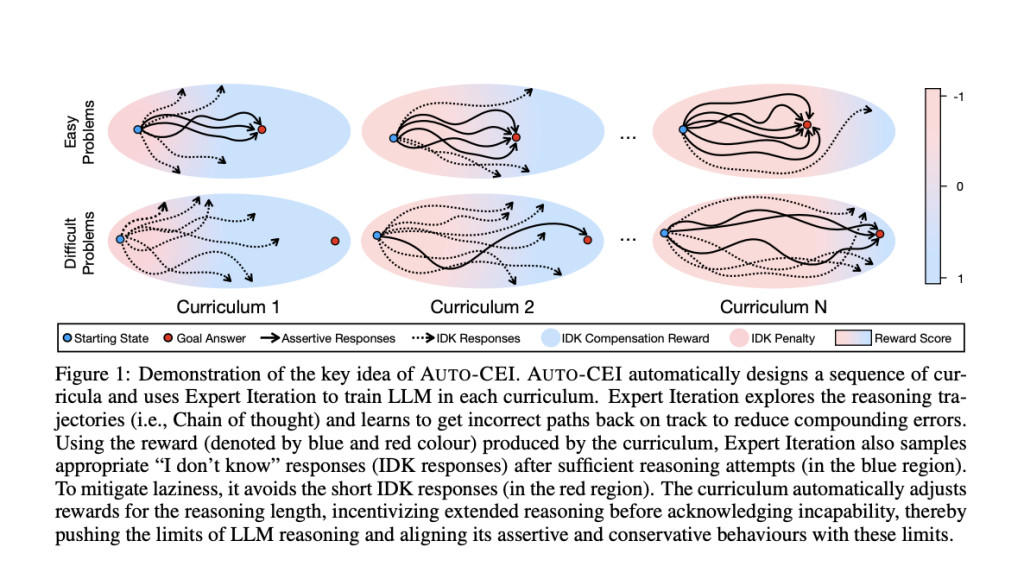

Large language models (LLMs) are increasingly utilized for complex reasoning tasks, requiring them to provide accurate responses across various challenging scenarios. These tasks include logical reasoning, complex mathematics, and intricate planning applications, which demand the ability to perform multi-step reasoning and solve problems in domains like decision-making and predictive modeling. However, as LLMs attempt to meet these demands, they encounter significant issues, particularly in balancing their ability to assertively answer questions with the risk of generating “hallucinated†information, answers that appear plausible but lack accuracy, and falling into patterns of “laziness,†where models frequently resort to saying “I don’t know†when uncertain. Finding a method that allows LLMs to deliver accurate, confidence-balanced responses without undue conservatism or inaccuracy has been a persistent goal.
LLMs face two central issues in performing these high-stakes reasoning tasks: they either overestimate their capabilities, leading to hallucinations or become overly cautious, defaulting to refusals in situations they could handle effectively. These behaviors stem from the models’ need to manage complex, multi-step reasoning processes that accumulate errors at each stage, compounding inaccuracies and reducing reliability. Techniques designed to mitigate hallucinations have focused primarily on factual mistakes by integrating external knowledge, retrieval-based strategies, or reinforcement learning (RL) approaches. However, these techniques are more suited to factual tasks and struggle in reasoning-based contexts, where inaccuracies result from flaws in logical progression rather than factual missteps.
Researchers from the National University of Singapore and Salesforce AI Research have proposed an innovative approach called Automatic Curriculum Expert Iteration (AUTO-CEI). This new method introduces a structured “curriculum†approach to LLM training that dynamically adjusts based on the model’s performance, enabling LLMs to align their responses with their actual capabilities. AUTO-CEI leverages a specialized reinforcement learning technique, Expert Iteration (EI), which iteratively refines the model’s policy by resampling responses and guiding them along correct reasoning paths. This iterative approach promotes assertive responses within the model’s limits and appropriate refusals for complex tasks beyond those limits, enhancing overall reasoning capacity.
The AUTO-CEI process begins by training the LLM to assess its performance boundaries. It uses the average number of reasoning steps required to reach a correct answer as a proxy for problem difficulty. Expert Iteration works within this curriculum, exploring possible reasoning paths to identify optimal, accurate responses. Correct answers receive positive rewards in this framework, whereas overly conservative or assertively incorrect answers incur penalties. Also, the curriculum adapts these rewards over time, incentivizing the LLM to engage in extended reasoning before opting to refuse an answer, thus pushing the model’s limits incrementally and avoiding premature refusals. Through repeated cycles of Expert Iteration, the curriculum hones the model’s capacity to handle progressively complex reasoning tasks with greater robustness.
In empirical testing across various benchmarks, including BoardgameQA, MATH, and Blocksworld, AUTO-CEI outperformed other state-of-the-art methods. BoardgameQA, which involves logical reasoning tasks based on rule-based deductions, saw a 10% increase in precision from the baseline when using AUTO-CEI, with the model achieving 84.5% precision and a refusal rate of just 29.4%. In MATH, a challenging dataset requiring long chains of reasoning in algebra and geometry, AUTO-CEI attained a 35.6% accuracy, indicating significant improvements in LLMs’ ability to navigate and conclude complex calculations. Meanwhile, in Blocksworld, a planning task where the model must sequence actions to achieve a specific block configuration, AUTO-CEI achieved a refusal rate of only 18.3%, balancing conservativeness with the need for assertive reasoning.
AUTO-CEI’s contributions have led to a robust solution for mitigating both hallucinations and excessive refusals. The model demonstrates the highest precision across reasoning tasks, maintaining a conservative refusal rate while avoiding unnecessary refusals in scenarios where possible solutions exist. AUTO-CEI has achieved accuracy rates that surpass existing reinforcement learning techniques by 10-24% while maintaining refusal rates between 18-36%, significantly reducing the model’s error rate. This marks an improvement over techniques like Vanilla Expert Iteration and retrieval-based reinforcement learning methods that either lack the assertive control required or fall short on task complexity.
The key takeaways from this research are:
- Enhanced Accuracy and Precision: AUTO-CEI demonstrates a substantial boost in precision, achieving up to 24% improvements in certain benchmarks, with accuracy rates as high as 80% in complex reasoning contexts.
- Effective Balance of Assertiveness and Conservatism: By refining LLMs’ responses to be assertive within capability limits and appropriately cautious for complex tasks, AUTO-CEI achieves an ideal balance, with refusal rates ranging from 18% to 36%, depending on task complexity.
- Improved Robustness in Multi-Step Reasoning: AUTO-CEI reduces step-wise errors in long chains of reasoning by rewarding sustained reasoning efforts, thus minimizing the likelihood of prematurely incorrect responses.
- Benchmark Performance: AUTO-CEI’s precision rates in BoardgameQA (84.5%), MATH (35.6%), and Blocksworld (91.5%) show its effective application across diverse reasoning tasks, establishing it as a versatile solution for AI-driven reasoning.

In conclusion, AUTO-CEI represents a significant advance in LLM training methodologies by balancing assertive and conservative behaviors based on reasoning limits. By incrementally enhancing the model’s problem-solving capacity while mitigating hallucinations and refusals, AUTO-CEI sets a new standard in reliable LLM reasoning across complex tasks, offering a scalable, adaptable solution for future AI development. This iterative, reward-based approach aligns the LLM’s behaviors with its limitations, ensuring more trustworthy and effective performance in critical applications across fields that demand accuracy and discernment.
Check out the Paper. All credit for this research goes to the researchers of this project. Also, don’t forget to follow us on Twitter and join our Telegram Channel and LinkedIn Group. If you like our work, you will love our newsletter.. Don’t Forget to join our 55k+ ML SubReddit.
[Trending] LLMWare Introduces Model Depot: An Extensive Collection of Small Language Models (SLMs) for Intel PCs
The post AUTO-CEI: A Curriculum and Expert Iteration Approach to Elevate LLMs’ Response Precision and Control Refusal Rates Across Diverse Reasoning Domains appeared first on MarkTechPost.
Source: Read MoreÂ



